What’s in a word?
Magnus Hirschfeld
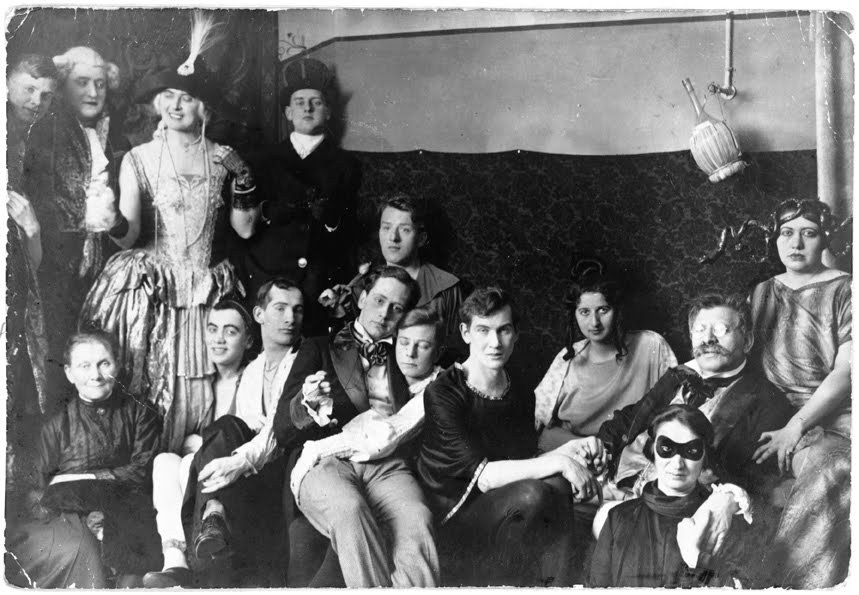

Last 27 January I went to two Holocaust Memorial Day events. No I am not Jewish, nor were all the victims of Hitler’s Endlösung “Final Solution”, Mengele’s experiments, and the Nazi Aryan utopian dream – which was a dystopian nightmare for everyone else.
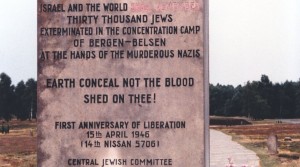
I did however study and teach Hebrew and aspects of Judaism in my past. I also visited the concentration camp, Bergen-Belsen, when I was 15. Today marks the 71st anniversary of the liberation of Auschwitz by the Soviets and Holocaust Memorial Day.
One internee at Belsen was Josef Čapek from Czechoslovakia a Cubist painter, cartoonist, writer and playwright. He wrote the utopian play “Land of Many Names” and is credited by his brother as being the first to invent and use the word “robot”. He was critical of Hitler and Nazism and was arrested in 1939. Whilst interned he managed to write “Poems from a Concentration Camp” but died in 1945, shortly before liberation.
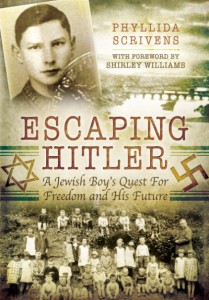
Joe Stirling, A Jewish teenage escapee from Nazi Germany, whose parents died in Sobibór concentration camp, lives in Norwich and continues to tell his survival story. Recently published as “Escaping Hitler“, it is a reminder to people of the Nazi Holocaust and the triumph of the human spirit. Joe has led an interesting and fulfilling life since arriving in England and is part of the Human Library project where he regularly regales people of all ages with his wit and wisdom.
As an LGBTI person and outspoken human rights activist, I could well have ended up in a concentration camp alongside Jews, Slavs, Roma, disabled people and many more. Sexuality, mental health, religious non-comformism, criticism of the state, ethnic origin were all factors that could have had one sent to a concentration camp and/or exterminated by bullet or Zyklon B gas – as hauntingly revisited in Philip K. Dick’s novel and now Amazon series, ‘The Man in the High Castle‘. Yes, Hitler singled out the Jewish race for a very particular and poisonous genocide, but others suffered too.
Many people don’t realise that Romany gypsies, those with mental and physical disabilities, abortionists, Jehovah Witnesses, non-conformist pastors and clergy, certain intellectual opponents, communists, and tens of thousands of homosexuals were sent to concentration camps by the Nazis, of which there over 1000, possibly many times that number spread across occupied countries, at least a dozen of which were extermination camps – to remove Lebensunwertes Leben “life unworthy of life”, especially the Jews.
Hundreds if not thousands of people were experimented on by Mengele, with castration, forced sex change interventions, growth hormones. Those born different, disabled, intersex or twins, were especially targeted for his torturous experiments.
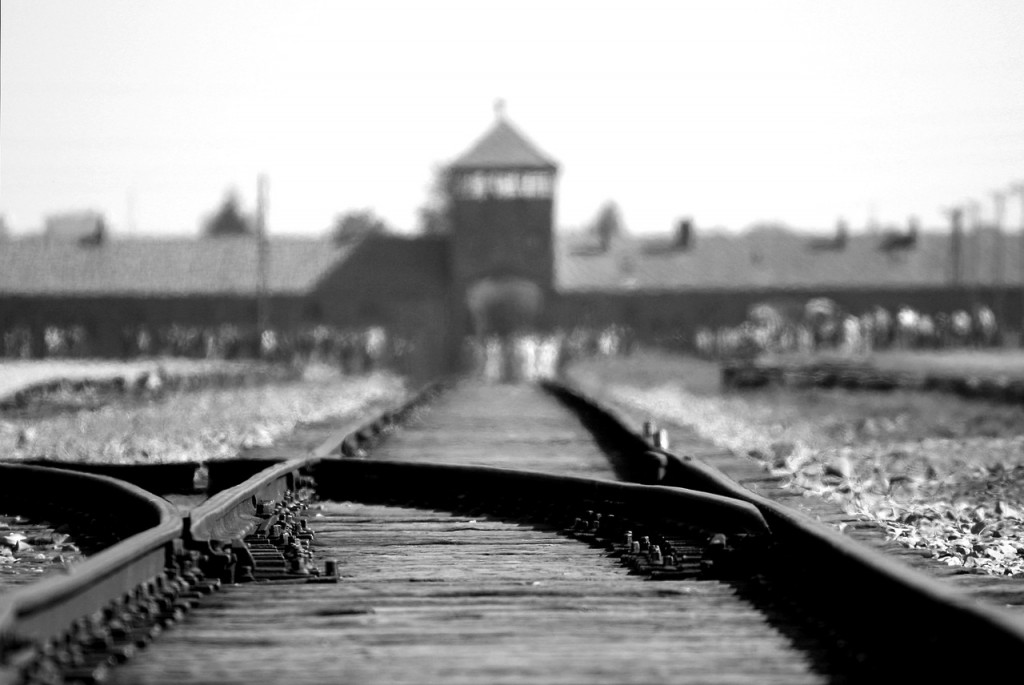
Labelled vice, degenerate, a plague, gay and bisexual men, many of whom were also Jewish, ended up incarcerated, experimented on, castrated, or killed.
“We must exterminate these people (homosexuals) root and branch… We can’t permit such danger to the country; the homosexual must be entirely eliminated.” – Heinrich Himmler
Furthermore, in 1945, they were not released but transferred to civil prisons as their sexuality remained illegal until 1968/9. Paragraph 175 outlawing homosexuality had rarely been enforced until Hitler took power in 1933. Germany only apologised in 2002 to the homosexual community for what happened to them before, during and after the Second World War.
Pink triangles, like the yellow star of David patch for Jews made by two yellow triangles, were sewn on to the camp clothes of homosexuals, but the same symbol also marked out rapists, paedophiles and other “sexual deviants”.
Black triangles were used for Roma, mentally ill, pacifists, anarchists and more. Later Roma badges were brown. Numerous other groups of people were classified, badged, and interned, or killed.
There was an outcry this week when it transpired that asylum seekers in Cardiff were being forced to wear coloured identification wristbands. If this were a music festival, and it were by age or event it would be quite different. After complaints the Clearsprings Group scrapped the policy.
Fear of difference drives prejudice. This week Trevor Phillips, former EHRC chair, has said that we should accept that British Muslims are “different” from the rest of society, and respect that, others have responded that we should not have to accept their difference.
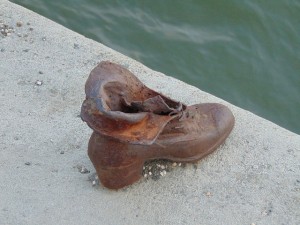
A memorial, to Jews shot and dumped in the Danube in Budapest, 1945, is a poignant image that is also beginning to symbolise the plight of migrants and refugees from current wars and genocides. “Shoes on the Danube Bank” was created by Can Togay and sculptor Gyula Pauer and shows just the left-behind shoes of the Jewish victims. Empty shoes have come to symbolise both silent protest at the Paris climate conference, and the positive response of communities to asylum seekers by offering shoes, including in Budapest.
Sadly, history and Hegel teach us that men and nations learn little and we do end up repeating the mistakes of the past. That is why the Holocaust and other genocides should be remembered. It’s easy to complain about human rights abuses and ethnic cleansing when it’s happening but wisdom is spotting the signs that it is about to happen. That means highlighting the laws and language that begin to scapegoat and marginalise, to discriminate and criminalise based upon sex, gender, faith, health, colour, race and ethnicity.
We can already see it in the political invective against “a bunch of migrants” (David Cameron in PMQs today), Donald Trump and Sarah Palin’s calls for American Muslim expulsion, and in the extremist cleansing by Islamic State of Yazidis, Christians, gays and non-Sharia Muslims. Meanwhile Syria continues its own purge, Turkey, Saudi Arabia subtly try to target Kurds and Shia, Israel treats Arab Israelis and Palestinians as second class.
As Santayana said, “Those who cannot remember the past are condemned to repeat it.” Sadly, most often, history teaches us that we do forget, repeat, and only learn from it after exhausting all other possibilities, as Aldous Huxley, Hegel, George Bernard Shaw and Abba Eban, all said in various ways.
“The most effective way we can combat this intolerance and honour those who survived and those who perished is to call on each other to do what the survivors have already done, to remember and to never forget.” – Steven Spielberg
We need to remember the Nazi Holocaust, Stalin’s similarly large-scale ethnic expulsions in Russia, state eugenics policies, Polpot’s purge in Cambodia, Rwanda, Bosnia, or the ethno-religious cleansing policies of ISIS or Boko Haram, and many more genocides and democides besides. It has happened more than once before and could, if not, is, happening again. That is why we remember Holocaust Memorial Day, so as not to repeat.
“First they came for the Communists
And I did not speak out
Because I was not a Communist
Then they came for the Socialists
And I did not speak out
Because I was not a Socialist
Then they came for the trade unionists
And I did not speak out
Because I was not a trade unionist
Then they came for the Jews
And I did not speak out
Because I was not a Jew
Then they came for me
And there was no one left
To speak out for me.” – Pastor Martin Niemoller
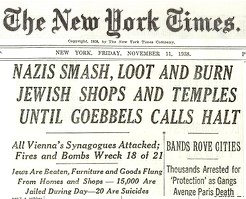
Tonight (9 Nov), around 10:30pm, begins the 77th anniversary of Kristallnacht, “the night of crystal/broken glass”. People have termed the current “migrant crisis” the worst in Europe since the Holocaust. Hungary and other countries are reacting to the influx of mostly Syrian and Afghan refugees. How will Europe integrate and accept them all? Will far-Right groups grow stronger in response? 1930s Nazi Germany emerging from a background of economic austerity saw blame and scapegoating of Jews, Communists, Homosexuals, Gypsies and more besides. Kristallnacht is a demonstration of orchestrated violence by a people that a decade before had been one of the most forward thinking nations on Earth, who had allowed Berlin to become a popular city of jazz and queer expression, a place where Jews were once proud to be German.
A British diplomat in Germany, Sir George Ogilvie Forbes, at the time, wired home a prophetic warning the year before the outbreak of World War 2:
“I can find no words strong enough in condemnation of the disgusting treatment of so many innocent people, and the civilized world is faced with the appalling sight of 500,000 people about to rot away in starvation.”
This underestimate might have been an upper limit had nations reacted differently and earlier to Hitler’s atrocities. How we react to the modern European refugee crisis is the moral barometer of our generation. Germany is of course now leading the nations of Europe in taking in asylum seekers.
Back in 1938, however, Germany witnessed an “orgy of destruction” as the then Daily Telegraph correspondent, Hugh Greene, wrote of what transpired in Berlin that night:
“Mob law ruled in Berlin throughout the afternoon and evening and hordes of hooligans indulged in an orgy of destruction. I have seen several anti-Jewish outbreaks in Germany during the last five years, but never anything as nauseating as this. Racial hatred and hysteria seemed to have taken complete hold of otherwise decent people. I saw fashionably dressed women clapping their hands and screaming with glee, while respectable middle-class mothers held up their babies to see the ‘fun’.” – Hugh Carleton Greene, Daily Telegraph, 11 November 1938
The downward rush to mob mentality was not universal and many were deeply ashamed of the pogrom, and some tried to help. The son of a US consular official heard the janitor of his apartment block cry:
“They must have emptied the insane asylums and penitentiaries to find people who’d do things like that!”
Sadly, the majority were quite sane. Inured by scapegoating hatred to a point of passive and then active involvement.
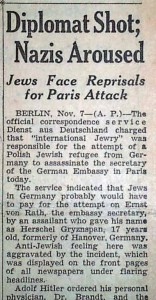
Although it was the killing of a German diplomat by a Polish Jew in Paris that sparked the raids and riots on Jewish interests, that was just an excuse that the various Nazi factions had been waiting for.
All across Austria and Germany thousands of shops, businesses, and half of all synagogues were torched and trashed. Around a 100 people were killed. Jews were arrested, 30,000 shipped to concentration camps, and even blamed and fined for setting it off, being charged a billion Reichsmark (circa £250 million then) for “property damaged in the rioting.”
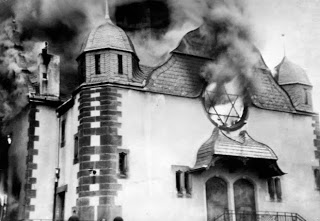 This level of anti-Semitism had not been seen since 12th-13th century UK and Europe when the blood libel allegations first triggered anti-Jewish violence, theft, murder and expulsion – mostly initiated in Norwich, England.
This level of anti-Semitism had not been seen since 12th-13th century UK and Europe when the blood libel allegations first triggered anti-Jewish violence, theft, murder and expulsion – mostly initiated in Norwich, England.
A less well-known massacre of about 100,000 Jews took place in 1648-49, in the Ukraine, when Cossacks rose up against the Jews blaming them for their Polish oppression.
A 2008 study on current anti-Semitic feeling in Europe, published in 2011, concluded that:
“The significantly strongest agreement with anti-Semitic prejudices is found in Poland and Hungary. In Portugal, followed closely by Germany, anti-Semitism is significantly more prominent than in the other western European countries. In Italy and France, anti-Semitic attitudes as a whole are less widespread than the European average, while the extent of anti-Semitism is least in Great Britain and the Netherlands”.
In all the countries studied apart from Italy, a majority answered that “Jews enrich our culture”. In Germany, nearly 70% said so, about the same as in Britain.
But nearly half of German respondents said that “Jews try to take advantage of having been victims during the Nazi era”. That’s compared to 22% for Britain, 32% for France, 40% for Italy, 68% for Hungary and 72% for Poland.
A separate study published by the German parliament in 2012 concluded that 20% of Germans held at least “latent anti-Semitism” – some sort of quiet, unspoken antipathy towards Jews.
Sadly, as Churchill said, “history does nothing but repeat itself” and never learns from it. Similarly, as Santayana never said (he actually said “Those who cannot remember the past are condemned to repeat it.”), we are condemned to repeat it unless we teach and learn, and so tonight we remember. Something Judaism is good at doing.
Whilst the socio-political and economic ingredients may have similarities with the 1930s we now have the EU, instant media, stronger safeguards, and hopefully memory – bad memories at that, to remind us never to go there again. Former Chief Rabbi Jonathan Sacks said “Memory is more significant than history” in an article in 2012 about the need for leaders to be great teachers.
Back in 2003, Sacks had delivered a lecture at the University of Cambridge on “Power and Responsibility”, in the subsequent discussion he drew attention to:
“the distinction between memory and history is crucial to Judaism. Three-quarters of the Hebrew bible is historical. Jews were, in Baruch Halpern’s phrase, “the first historians”. They were as J.H. Plum says in The Death of the Past the first people to see meaning in history, history as a narrative. Yet it’s very interesting to ask what the biblical word for history is and there isn’t one. When Hebrew was revived for the modern state of Israel and they wanted a word for history, they came up with historic, they chose the Greek word. Instead the bible uses a quite different word which appears 169 times, zachor: remember. There is a difference between history and memory; to be very crude, history is his story – it happened some time else to someone else. Memory is my story.”
It is sobering to note that 10 years before Kristallnacht the Nazi NSDAP gained just 2.6% of the vote in the 1928 German Reichstag elections, 2 years later that was 18% and after 2 further years the Nazis were the largest party and Hitler had 37% of the vote in the Presidential election. By 1933 Hitler was in coalition with Hindenburg’s DNVP and it took just months to suspend civil liberties in the name of protecting the people, ban trade unions – who were heavily “associated” with Communism, open Dachau – at first for just political prisoners, and on April 1 to initiate a one-day boycott of Jewish shops and businesses. Within less than 6 months Hitler banned all democratic opposition and declared the Nazis “the only political party in Germany.” By 1934, in just 18 months, Hitler’s coup received 90% support in a public plebiscite.
It took only six-and-a-half years for Hitler’s support to rise 40-fold from a small far right protest group to absolute dictatorial control. One would hope that it should be impossible now? Yet far-right groups have grown in influence again, as in 1930s Germany, on the back of high unemployment, austerity and spreading fear about difference, security and xenophobia.
A 2013 Guardian article, argued that we do not need to fear a European lurch to the far-Right whilst a 2014 article elsewhere and on Al Jazeera said the opposite after the far-Right did gain significant seats. The Guardian had played down any extremist showings of 7-21% in Austria, Czechoslovakia, France and Greece, among far-right parties and then enumerates the more limited 1-5% polled elsewhere. Quoting another report the writer dismissed “the far right [being] on course to gain 34 to 50 seats in the European Parliament, which is roughly 4% to 7% of the total”. In fact, the National Front is leading the pre-European election polls in France with 24%, a four-fold increase in just 4 years. UKIP has made not insignificant gains in the UK polls and potentially in the European elections.
Left Foot Forward (LFF) quotes Le Nouvel Observateur columnist Jean-Gabriel Fredet’s comment that, “Fear of immigration, crises of identity and recession combined have created a climate propitious to ultranationalist, anti-European ideology”. LFF comments: “Ironically, France’s [Front Nationale] FN has grown in popularity as the party has combined anti-immigrant sentiment with the sort of anti-globalisation, anti-market rhetoric that is usually the preserve of the left. This explains why the French Socialist Party is losing just as many voters to Len Pen as the centre-right UMP.”
Far-Left parties, for example the Communist Party in Czechoslovakia, Syriza in Greece and in Germany, Die Linke, are also making gains at the expense of centrist parties of all flavours.
Hermann Göring met with other Nazi leaders barely days after Kristallnacht on 12 November to build on what had happened:
“I have received a letter written on the Führer’s orders requesting that the Jewish question be now, once and for all, coordinated and solved one way or another… I should not want to leave any doubt, gentlemen, as to the aim of today’s meeting. We have not come together merely to talk again, but to make decisions, and I implore competent agencies to take all measures for the elimination of the Jew from the German economy…”
We should be careful of any “economic” arguments that are made to “solve” the current migrant crisis, especially when immigrants actually make a positive net contribution to the economy by some measures, and in others are a zero-sum cost. The Guardian writes that “There’s plenty more space for humanity on this ‘tiny’ island.”
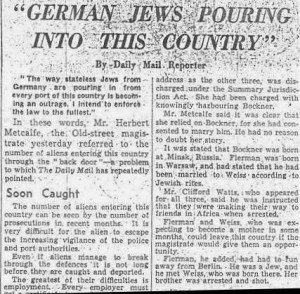
It comes as no surprise that the Daily Mail, in 1938 was complaining about the “German Jews Pouring into this country by the back door” and reporting a magistrate as saying how the law would be enforced “to the fullest” to eject them. Echoes of attitudes to the Calais migrant crisis?
Similarly, in December 1938, the Netherlands closed their borders to Jewish refugees arguing that it would cause economic pressures and would only “further fan the flames of anti-Semitism“. Despite SDAP pressure the then Dutch government opposed letting in more “undesirable” Jews to its “already densely overcrowded territory” as that would change the character of the Dutch “tribe”.
Party politics and economics aside, what we should be aware of from the lessons of history is the scapegoating of any minority, race, nation, diversity, disability etc., in the name of blame for current economic troubles. What we need is more immigration, greater integration and further interfaith understanding. Only then can we learn from each other and hopefully consign extremism, fear and terror to history.
[An older version of this article was published here in 2013 and on facebook.]
best herbal supplements sex drive cbd gummies and erection extenze fast acting male enhancement long lasting sex without pills top gun male enhancement pills safety of rlx male enhancement does maca root help with sex drive rhino 200k pill review male sex pills onenight stand over the counter penis enlargement pills pills for stronger erection otc alpha q male enhancement reviews 10 pack male enhancement pills top 10 natural erection pills medically enlarging a penis does male enhancement stiff nights work what drugs can help with erectile dysfunction vegas strips male enhancement reviews diet while using ed pills consumer reports male enhancement productsedema from blood pressure medication low blood pressure reasons and treatment which blood pressure medications protect kidneys blood pressure medications and weight gain alcortin blood pressure medication what is a cheaper version of bystolic blood pressure medication blood pressure medication at night time cinnamon blood pressure medication b blood pressure medication how to lower high blood pressure fast without medication naturally low blood pressure and chicago medical proven ways to lower your blood pressure without medication high blood pressure medication clonidine what are common side effects of high blood pressure medication medications taken for high blood pressure do high blood pressure medications thin the blood high blood pressure hypertension diagnosis and treatment mayo mayo clinic accent seasoning and blood pressure medication prednisone and blood pressure medication can i just stop taking my blood pressure pills